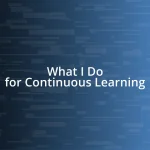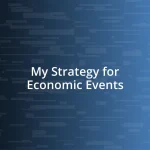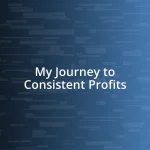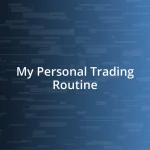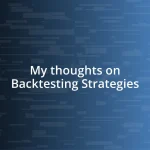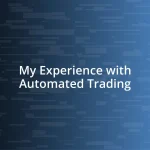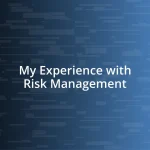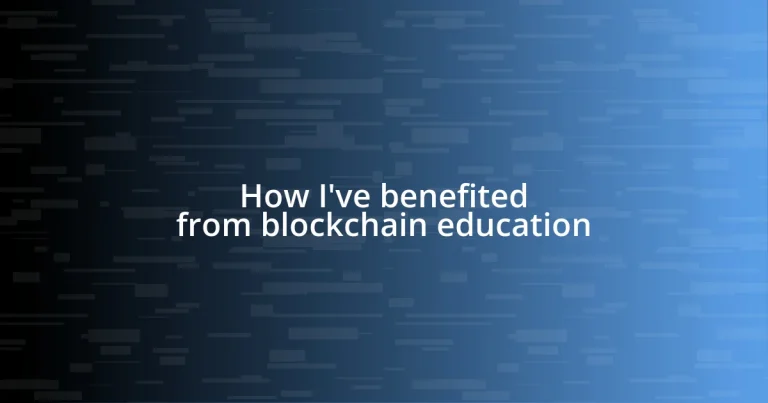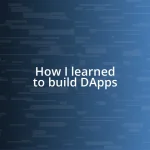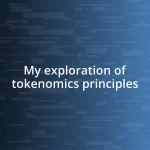Key takeaways:
- Understanding blockchain’s decentralization empowers individuals, enhancing trust and reducing disputes in transactions.
- Education in blockchain is essential for fostering industry knowledge, community engagement, and career opportunities across various sectors.
- The future of blockchain holds immense promise, with potential transformations in supply chain management, decentralized finance, and educational advancements.
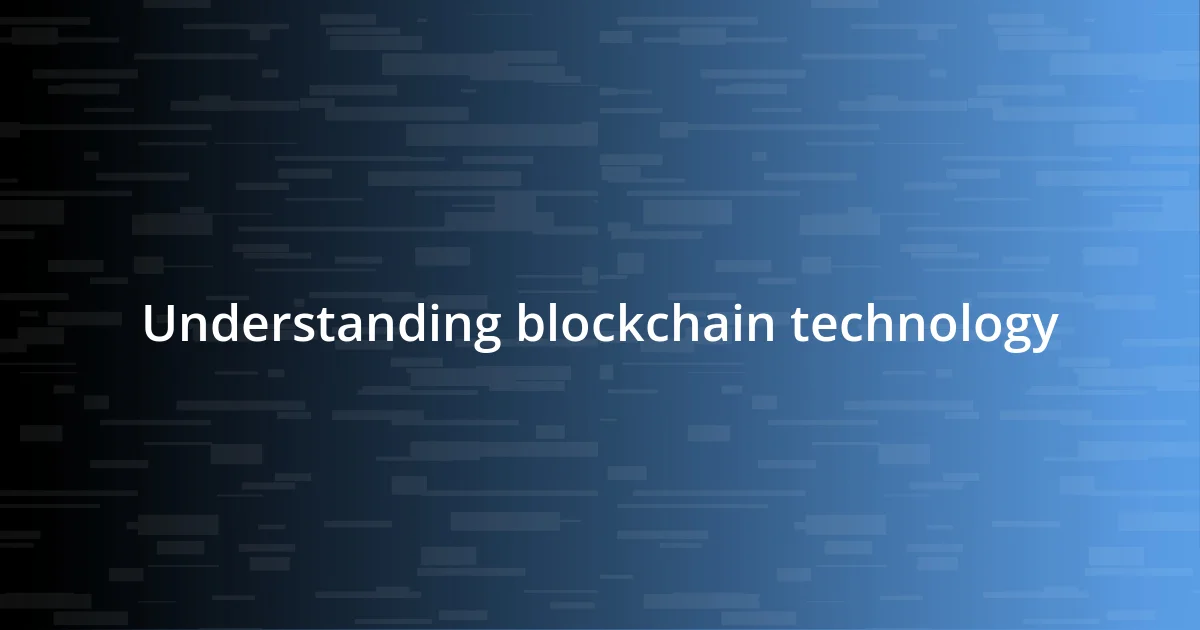
Understanding blockchain technology
To grasp blockchain technology, it’s crucial to understand its core principle: decentralization. This means no single entity controls the entire system, which I find incredibly empowering. When I first learned about this, I couldn’t help but think, “What if we could apply this to other areas of our lives?”
In my early encounters with blockchain, I was amazed by how it creates a secure and transparent ledger of transactions. Imagine a bright, sunny day when a friend and I decided to split the costs of lunch. Trusting each other was easy, but what if we had a third person involved? Blockchain allows everyone to see the same information, reducing the chances of any dispute. The level of trust this technology promotes was an eye-opener for me.
Moreover, the way blockchain enables smart contracts—self-executing agreements with the terms directly written into code—really changed my perspective on efficiency. I often wondered how many people were waiting on tedious paperwork and signatures to finalize their deals. Learning about smart contracts made me feel hopeful about a future where efficiency reigns, urging me to consider my role in advocating for such innovations.
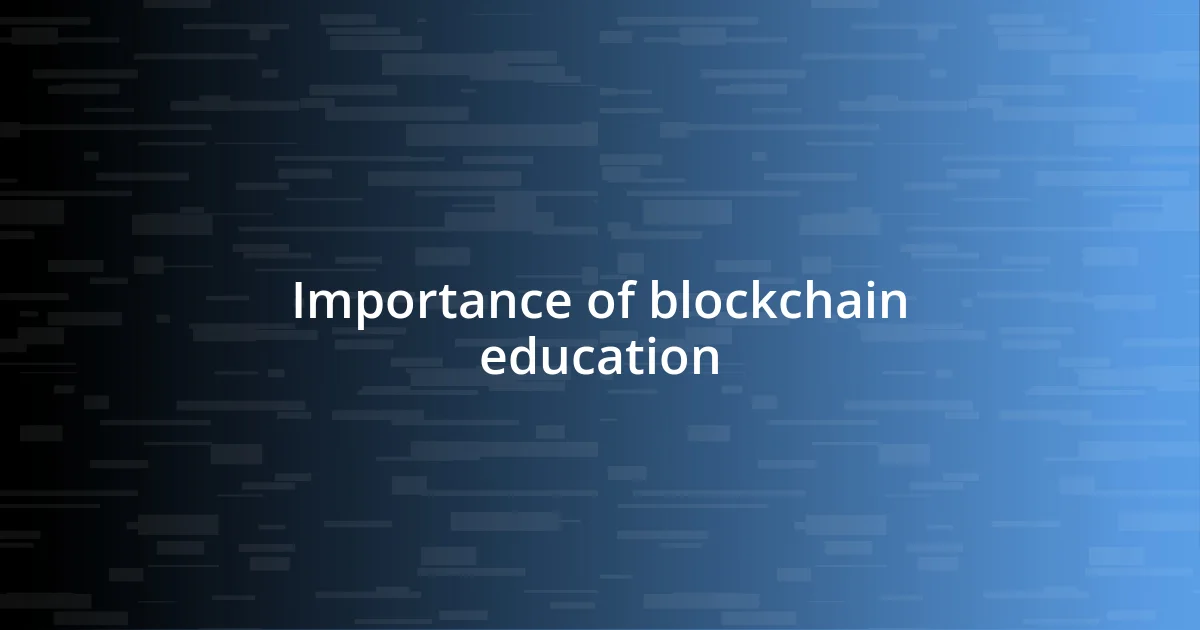
Importance of blockchain education
Education in blockchain technology is vital for anyone looking to grasp the future of finance and data management. The insights I’ve gained have helped me see how blockchain can empower individuals and businesses alike. For instance, I remember the first time I discussed blockchain with my colleagues; it was like a light bulb went off, and we all realized the potential for increased security and efficiency in our projects.
As I dove deeper into blockchain education, I discovered its applications in various industries, from healthcare to supply chain management. I was once at a workshop where a speaker illustrated how blockchain could streamline medication tracking; this not only impressed me but also sparked a conversation about collaboration in healthcare. Understanding these implications really cemented my belief that blockchain education is indispensable for anyone wanting to stay relevant in today’s tech-driven world.
Moreover, blockchain education fosters a sense of community. During my learning journey, I engaged in online forums where people shared success stories and challenges within the ecosystem. It reminded me of camaraderie in group projects during school—where the synergy of ideas leads to innovation. This sense of belonging and shared exploration made my educational experience far more enriching.
| Key Aspect | Benefit of Blockchain Education |
|---|---|
| Empowerment | Understanding decentralization fosters individual confidence. |
| Industry Applications | Knowledge of diverse uses broadens career opportunities. |
| Community Engagement | Building networks enhances learning and collaboration. |
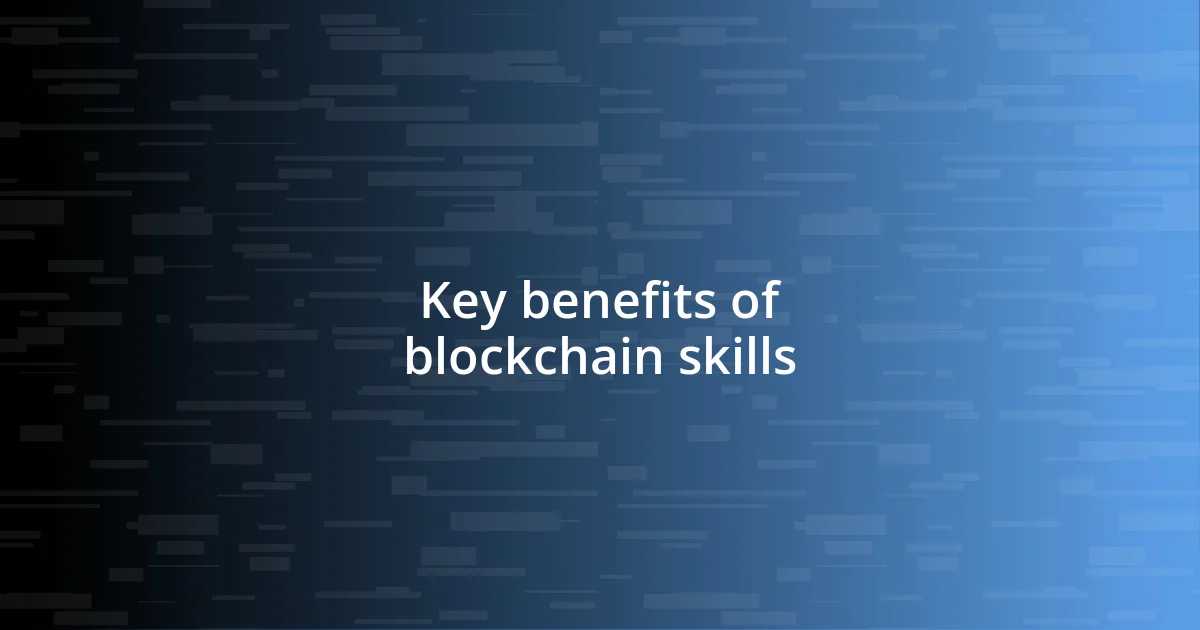
Key benefits of blockchain skills
The key benefits I’ve found from acquiring blockchain skills are profound and far-reaching. One of the most striking aspects is the empowerment that comes from understanding how decentralized systems work. I recall a moment during a recent discussion with peers when I shared insights about decentralization, and I could literally see the spark of curiosity in their eyes. It felt like unveiling a secret, one that promised to shift the balance of power from centralized authorities to individuals. That shift is not just theoretical; it transforms how we engage with technology every day.
Furthermore, the practical applications of blockchain in various sectors highlight its vast potential. I remember attending a hackathon where my team worked on a blockchain solution for secure voting. The thrill of brainstorming innovative ideas with like-minded individuals reminded me that we’re just scratching the surface of what blockchain can achieve. It drove home the message that expertise in blockchain not only opens doors professionally but also allows you to be part of groundbreaking projects that can change lives.
- Greater Career Flexibility: Mastering blockchain technologies opens up numerous career paths in various industries.
- Enhanced Problem-Solving Skills: Developing blockchain solutions fosters critical thinking and creativity.
- Networking Opportunities: Engaging in blockchain communities can lead to meaningful partnerships and collaborations.
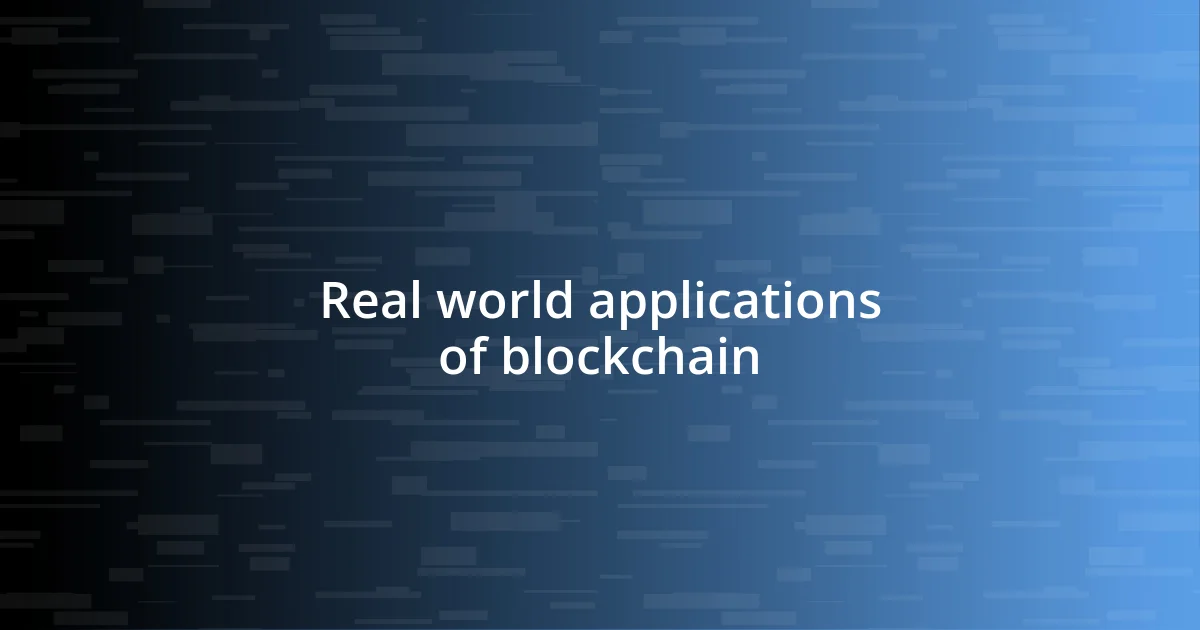
Real world applications of blockchain
Blockchain isn’t just a buzzword; it’s actively reshaping real-world applications that I’ve found fascinating. Take supply chain management, for example. I remember watching a documentary showcasing how a food company implemented blockchain to trace the journey of their products. It amazed me to see not only the transparency it brought to consumers but also how it significantly reduced waste. Isn’t it incredible how technology can make our food system more efficient and trustworthy?
Another application that struck a chord with me is in the realm of digital identity verification. During a recent seminar, a speaker shared a case study about refugees using blockchain to establish their identities. I felt a wave of emotion realizing how this technology could provide people with a sense of security and empowerment in dire situations. Can you imagine the impact of restoring dignity to individuals who have lost so much?
Moreover, the impact of blockchain in finance has been nothing short of revolutionary. Participating in a webinar focused on decentralized finance (DeFi) opened my eyes to how individuals can now access loans without traditional banks. This not only creates inclusivity but also democratizes financial services. I found myself wondering how many people could have their lives changed by simply having access to the capital they need. The possibilities are endless, and it leaves me feeling excited about what’s next in this ever-evolving landscape.
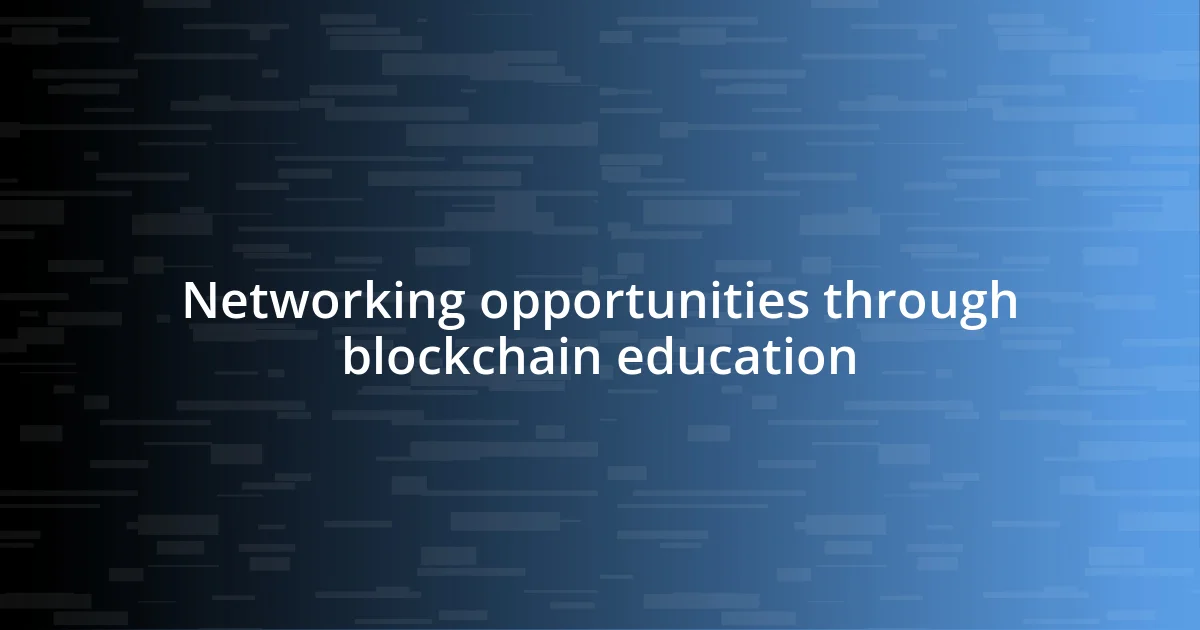
Networking opportunities through blockchain education
Through my journey in blockchain education, I’ve encountered incredible networking opportunities that have transformed my professional landscape. At a recent blockchain conference, I casually joined a breakout session and found myself in a deep conversation with a developer from a prominent startup. I was surprised by how easily we connected and began discussing collaborative projects that stemmed from our shared interests. It’s exhilarating to think about the potential collaborations that can arise from such unexpected encounters.
I’ve also tapped into various online communities centered around blockchain, which have become invaluable resources for connections and mentorship. Just last month, I reached out in a forum, seeking advice on a complex project. To my delight, several experienced professionals responded, offering guidance and even expressing interest in working together. Isn’t it incredible how these virtual spaces can foster genuine relationships that might lead to groundbreaking initiatives?
Moreover, I’ve noticed that my participation in blockchain meetups has led to friendships that extend beyond just professional interests. There’s a sense of camaraderie when discussing shared passions for innovation and technology. I recall one evening with fellow enthusiasts where we exchanged stories of our blockchain journeys over coffee. It reminded me of the power of connection: how sharing experiences can ignite ideas and form lasting partnerships. Networking in this field isn’t just about gaining contacts; it’s about building a community that thrives on shared knowledge and aspirations.
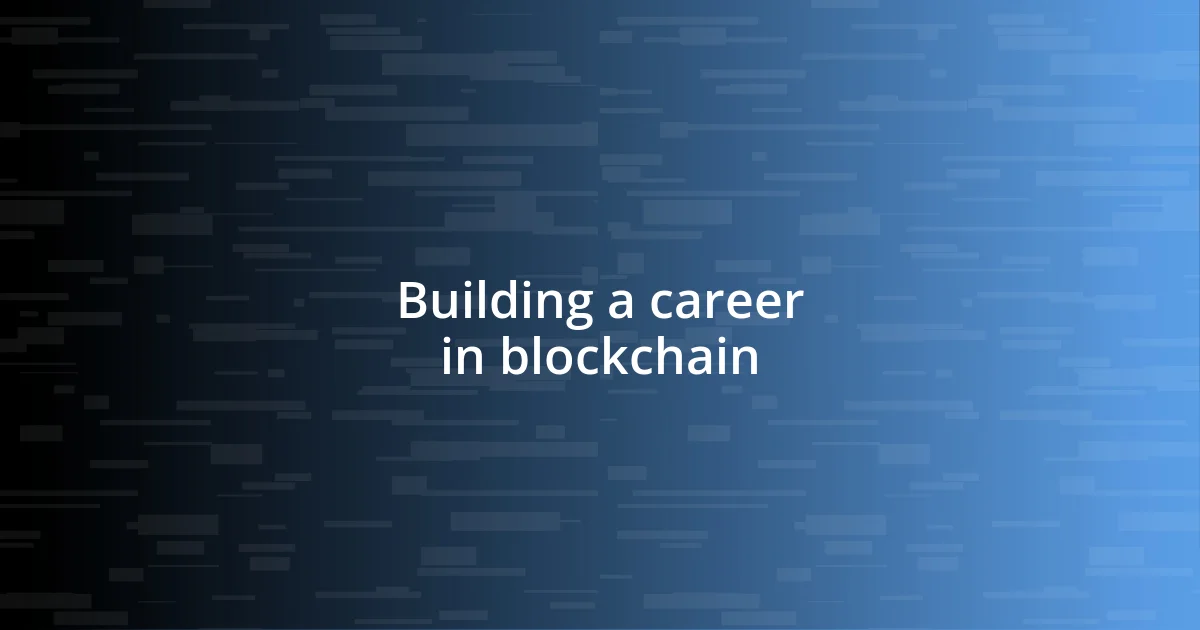
Building a career in blockchain
Building a career in blockchain has truly been an enlightening experience for me. When I first considered venturing into this field, I felt a mix of excitement and uncertainty. I distinctly remember attending my first blockchain workshop, where the facilitator explained how acquiring skills in smart contracts and cryptocurrencies could open doors to numerous job opportunities. It was that moment when I realized I wasn’t just learning about technology; I was equipping myself with the tools to create my own future.
Through my exploration, I discovered the importance of continual learning in this rapidly evolving industry. I set aside time each week to read whitepapers and follow thought leaders on social media. This active engagement has given me a strong grasp of emerging trends, like Layer 2 solutions and NFTs. I often reflect on how these initiatives can redefine conventional industries. It’s exhilarating to think about the limitless opportunities waiting for those willing to adapt and innovate.
Furthermore, I found that internships within blockchain startups were pivotal in building my resume. I remember landing an internship that allowed me to work on a real-world project involving decentralized applications. The hands-on experience amplified my understanding and made theoretical concepts tangible. I often ask myself: how many people overlook the potential of practical experience in their career journey? It’s vital, in my opinion, not only to learn but also to apply, as that’s where the real growth happens.
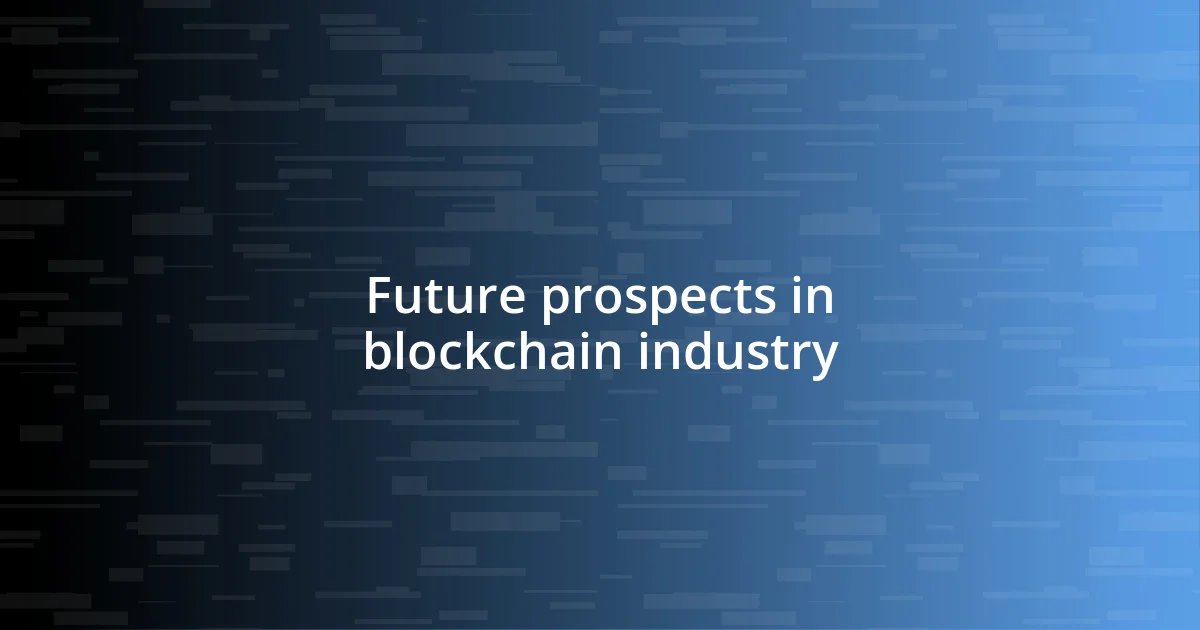
Future prospects in blockchain industry
The future prospects in the blockchain industry look incredibly promising, and I’m genuinely excited about the opportunities that lie ahead. Just the other day, I was reading about how major corporations are beginning to integrate blockchain for supply chain management. It made me think: what if we could see the entire journey of a product from inception to delivery with absolute transparency? The potential to revolutionize industries like logistics and finance is frankly mind-blowing.
Additionally, I’ve been following the rise of decentralized finance (DeFi) platforms. It’s fascinating to see traditional financial systems challenged by these innovative technologies. When I think about my own financial future, the idea of having direct control over my assets without intermediaries is liberating. The question that excites me is how many people will start to leverage these technologies to empower themselves financially?
I also can’t help but marvel at the educational shifts happening around blockchain. As more universities introduce blockchain courses, I wonder how many future leaders will emerge from these programs. I often think back to my own educational experiences; it’s encouraging to know that the next generation will have opportunities to learn about this technology deeply and comprehensively. This evolution not only fuels innovation but also inspires collaboration across various sectors, making the blockchain landscape even more dynamic.

